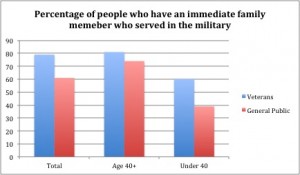WASHINGTON – Some veterans’ advocates are concerned public support of troops returning from war could wane as fewer young Americans have an immediate family member who has served.
While just more than three quarters of adults older than 50 said they had a family member who served in the military, only a third of those 18-29 could say the same, according to a recent study from the Pew Research Center.
Deborah Harmon- Pugh, campaign chair of the Women Veterans Rock Rally and Advocacy Campaign, said she’s worried the trend could directly impact public support, public service (volunteering for vets) and funding.
“When Americans are less aware, it (veteran’s support) just doesn’t get the kind of support it needs,” she said.
Veterans require public support and resources to transition back to civilian life, Harmon- Pugh said, and she’s fearful that given the economy, people will not make it a priority.
“In the absence of a draft, for a growing number of Americans, service in the military, no matter how laudable, has become something for other people to do,” said former Secretary of Defense Robert Gates in a recent appearance at Duke University
The wars in Iraq and Afghanistan are the first large-scale conflicts since the American Revolution fought entirely by volunteers, said Curtis Gilroy, director of Accession Policy at the Department of Defense.
The force of 2.4 million active and reserve members, according to Gilroy, is less than 1 percent of the population – the smallest it’s ever been.
The study also found that veterans are more likely than civilians to have a family connection in the military. Half of veterans said their parent served, compared with only 41 percent of civilians.
There is also a disparityamong peers – while 43 percent of veterans had a sister or brother who had served, only 27 percent of civilians could say the same.
Even greater, however, is the difference between veterans who had a son or daughter serve – at 21 percent – and civilians who had a child serve, which is at 9 percent.
“Although recruiting is a challenge, the success of our 37-year-old All Volunteer Force thrives,” Gilroy said. “However, as the veteran population continues to decline, fewer people have exposure to the military.”
“With fewer adults having served, they – as influences of youth – are less likely to recommend military service to young people,” Gilroy said.
The PEW study too found that those with a family member who served are more likely to recommend the military as a career for young people. About half of those connected with the military said they would suggest a young person join, compared with 43 percent of civilians.
Three quarters of veterans surveyed said they would advise young people to join.
Both veterans and those outside of the military overwhelmingly said they didn’t think civilians understand the challenges members of the military face.
Harmon-Pugh said the misunderstanding leaves out a lot of people.
“We talk about those who serve and those who come home, but what about those families that are left to fend for themselves?” she said.
Still, she said she was surprised to learn that people do not feel connected with the military because she thought Michelle Obama and Dr. Jill Biden’s “Joining Forces Initiative” has been successful as a catalyst for discussion – particularly at the community level.
“If you know someone who served then you understand the context of so many things,” she said. “Too few of us are carrying the burden of responsibility.”
The study also examined demographics and found that those in the South are more likely to be related to a service member, at 64 percent, than someone in the Northeast, at 56 percent, or West, at 57 percent. Also, people who live in rural areas were slightly more likely to have a family member who served than someone living in the city.

